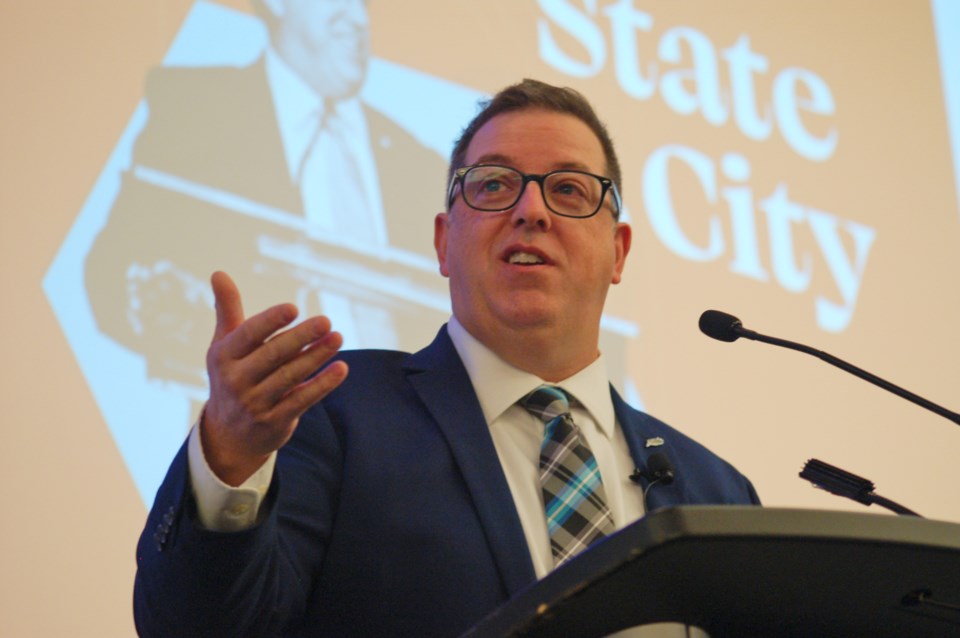Growth is coming. It’s time for the community to get behind it, for developers to commit to putting shovels in the ground, for upper-tier governments to do more to help and for city council to get out of the way so homes can be built more quickly.
That’s the thrust of Mayor Cam Guthrie’s plea to the community – delivered during the annual Mayor’s State of the City Address on Thursday morning – which he said is prone to raising NIMBY (Not In My Back Yard) objections to development proposals.
“Hear me citizens of Guelph, it’s got to stop,” he told a crowd of Guelph Chamber of Commerce members and dignitaries gathered at the Delta Hotel and Conference Centre for the annual event. “More often than not it’s the same recipe of complaints that come from every neighbourhood.
“Not every development is going to destroy the value in your home, cause accidents and kill or injure children or animals, or cause massive parking issues or have a design element you don’t like.”
Not only is the city already in a housing crisis, much like others, the provincial government is calling on city council to pledge its support and implement actions intended to allow for the creation of 18,000 new units by 2031.
That pledge, Guthrie said, is expected to be formally considered by council later this month.
Community objections aren’t the only obstacle developers can face. Council sometimes assumes the role of “gatekeeper,” the mayor said, calling for an increase in delegated authority for city staff to approve more housing-related matters without council’s involvement.
“I think we should embrace as much of this as possible,” he said in response to a crowd question about how the city can speed up the approvals process.
In doing so, he pointed to the creation of between 250 and 300 basement apartments annually in the city, as well as a draft comprehensive zoning bylaw review that tentatively includes permission for properties to have three units – main, a basement apartment and an accessory unit in the rear yard – without requiring zoning bylaw amendments, known as “as-of-right” zoning.
“We’re one of the top in the province and it doesn’t have to come to council,” Guthrie said of creating basement apartments, suggesting council needs to be more hands-off when it comes to new housing units in existing areas where there’s already infrastructure in place.
Housing is needed across the spectrum, he noted, including supportive, affordable, social and non-profit housing as well as market rental and ownership.
“The housing crisis is real and it’s been coming for a few years now,” Guthrie said. “But now it’s smacking us in the face and in our wallets, big time.”
Just as the province is asking city council to sign a pledge to move on the housing issue, Guthrie wants developers to do their part by ensuring project applications are complete when submitted to the city for consideration and to commit to getting shovels in the ground as quickly as possible once approval is granted.
“We can only approve, we don’t build,” he said.
There are several ways the provincial government can help municipalities like Guelph, Guthrie continued, and not all of them have to do directly with housing, though there are steps that can be taken on that front
Among them, the mayor said in response to a question, is funding to assist with the clean-up of contaminated sites in order to make way for development.
“Give us the money to clean up the land and you win,” he said, referring to the provincial government. Such a program would see potentially harmful pollution removed, space for new builds in areas with existing infrastructure. “It’s perfect.”
The city is also looking at “resurrecting” brownfield cleanup grants, Guthrie added.
Provincial assistance is needed to address issues of homelessness, addiction and mental health support too.
“People are dying in our community from these issues. Businesses are suffering from these impacts as well,” Guthrie said. “We need to rise up together as a community to tell them that what people are going through is unacceptable, that we need funding urgently or its going to get worse – a lot worse.”
In June of last year the Ontario Big City Mayors, which was chaired by Guthrie at the time, unanimously approved a resolution calling for an emergency meeting with the province to discuss potential solutions.
“It’s now eight months later, with no meeting,” he said. “Frustrated is an understatement.
“Healthcare is a provincial jurisdiction. We need to hold them to account just as you would hold me to account for things that are under my jurisdiction.”
